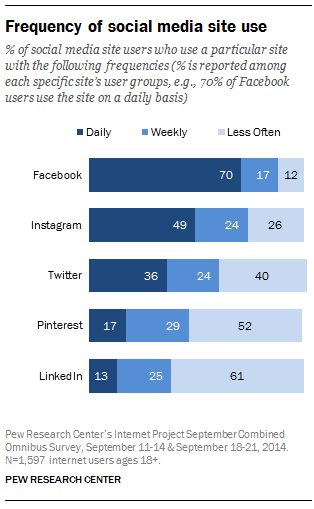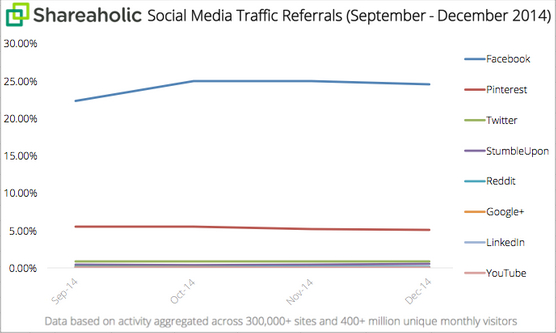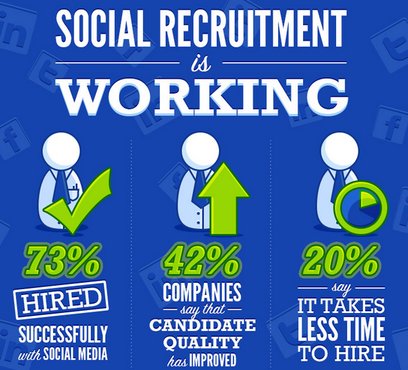 We’ve all been there – you spend a bunch of time creating optimised social media profiles on the right platforms for your business and posting great content, but at the most you only get a few clicks.
We’ve all been there – you spend a bunch of time creating optimised social media profiles on the right platforms for your business and posting great content, but at the most you only get a few clicks.
Frustrating! Especially if you’ve been sold on the premise that social media will drive valuable traffic to your website.
It’s tempting to listen to all the doom-and-gloom that has been put out there about social reach, yet Facebook is still one of the top social media platforms – despite a well-documented decline in organic traffic last year.
According to data from Shareaholic, Facebook still drives 24.63% of all traffic to websites. Social media overall drives 31.24% of traffic to sites.
Organic reach is an issue across all platforms however, with engagement being down by more than 50% on Facebook alone. The fact is, if you want to see better results on social media, “pay to play” is here to stay.
It can be tempting to pack it all in and focus more efforts elsewhere, but what if there are other benefits to being on social media besides driving website traffic?
Before you close your accounts, or join the Facebook exodus over needing to pay for better reach, consider which other benefits of social media are possible for your business. Backed by some of the latest stats from social media research, we’ve found at least 7…
Get A PDF Version Of This Post – CLICK HERE
7 Benefits of Social Media
1. Increase Brand Recognition
Ok, you may not be getting as much visibility as you’d like or as many clicks through to your website, but sticking with social media means that you are making your brand more visible than what it is likely to be without.
According to this infographic from Quicksprout, 33% of consumers use social media to find new products, brands and services – would you really want to be MIA while your competitors come up in consumer searches?
Statistics from Pew Research show that, rather than being the fad that many first believed the rapid growth of social media to be, engagement is actually growing year on year, with Facebook still leading the charge. The most recent statistics, published in January 2015 are shown in the graph below…  If you need further convincing to stick it out, 82% of buyers say that they have more trust in a company when the company and its CEO are active on social media. So it seems we are now using social media presence as a metric to decide whether a company is reputable for buying from – a big thing to consider if you’re a small business who largely sells online!
If you need further convincing to stick it out, 82% of buyers say that they have more trust in a company when the company and its CEO are active on social media. So it seems we are now using social media presence as a metric to decide whether a company is reputable for buying from – a big thing to consider if you’re a small business who largely sells online!
In a crowded digital world, potential customers are looking for more clues to show them that a business is legit, therefore you should be using social media as an opportunity to syndicate your content and potentially reach a huge number of people who have never heard of you before. As noted by Forbes, an otherwise apathetic customer may become better acquainted with your brand after seeing you pop up on different networks. Here are some tips for increasing brand recognition on social media:
- Do your research. It is relatively easy to search through social media platforms and discover which ones are more likely places for your target market to hang out. Stick to those platforms rather than having a presence on every one – you’re more likely to manage a couple of platforms well than if you divide your attention between a number of them.
- Know your audience. You know where they hang out, now what is it that they like to see on those platforms? If you are in tune with this you are better able to produce the social content that gets engagement and builds your recognition.
- Test different posts. You can test a number of things with your posts, from the type of content posted to the times when you post it. Remember that posts on Facebook get 75% of their engagement in the first 5 hours so test frequency as well.
2. Build Relationships on Social Media
The whole point of social media is that it is meant to be “social”! Somewhere along the line many brands confused their number of likes or followers with actually being engaging or social on social media. The fact is there are many accounts with thousands of followers which really do nothing much for the companies who own them.
A true benefit of doing social media well is that businesses should be able to build real relationships with engaged fans. Traditional advertising can never achieve the relationship-building potential of social media because it is a one-way “push” of material from the business to the consumer. The key to building solid relationships through social media is that two-way communication.
Here are a few tips to help you build relationships on social media:
- Look for ways you can help others, such as by jumping in to answer questions in groups or communities.
- Always respond to anyone who comments on your posts in a genuine kind of way. (This is the same way you should participate in any social media conversation!).
- Post articles and ask questions in communities and groups, but don’t over-promote your business!
- Continue to post regularly. As this post from Constant Contact shows, your social platform may be one of the first things searchers find for your business, so if it hasn’t been updated in a long time, or if customer comments or questions have been ignored, it’s not a good look!
3. Position Yourself As An Expert
Social media offers you a unique opportunity to position yourself as an expert by the content which you post both on your own accounts and in any groups or communities you participate in. There are a number of benefits to you and your business of being positioned as an expert, including standing out in the crowded market online and (hopefully!) being at the forefront of people’s minds when they are looking for answers in your niche area.
While you may not be seeing immediate benefits of traffic being driven to your website, if you keep up with regularly joining in industry conversations and posting your own unique content, you never know how far down the track someone may remember you and come looking because they need something. Here are some ways you boost your expert cred on social media…
- Join and participate in relevant groups (or create your own if there isn’t one!). Answer questions, give opinions and generally be helpful!
- Find relevant Tweet Chats and join the conversation.
- Regularly create valuable, desirable content and share on your own social media profiles. It’s ok to occasionally share your own stuff in groups too, just make sure that your participation doesn’t begin and end with only sharing your own content.
- Become and expert by association. There are a number of ways that you can leverage the knowledge, fame or expertise of others to boost your credibility. We discuss this in our podcast, “Famous By Association”.
4. Improve Brand Loyalty
Increasingly, building a successful business means building and interacting with an engaged tribe who resonates with how you share your story. Social media is one of the best ways you can consistently share your story with your followers (check out these Instagram tips for business here).
Studies from Texas Tech University agree that social media improves brand loyalty by nurturing a connection with your followers. As pointed out by Socialnomics, achieving brand loyalty through social media involves creating a successful long-term strategy – that means while you may not be driving as much website traffic as you’d like right now, you should keep your eyes on the end-game rather than putting too much emphasis on short-term stats.
What can you do to improve brand loyalty via social media?
- Develop a clear strategy. Rather than social media being another task that has to be slotted in, craft a plan in behind it to tell your story and share the type of content your target audience appreciates.
- Make yourself available for customer support/questions. A huge number of customers are posting social media messages that require a response, yet businesses are not overall doing a very good job of being responsive (check this out for how to use Twitter for customer service). Remember, many customers (or potential customers) are now bypassing website support desks and jumping straight onto social media, so be the business who responds promptly!
5. Legitimise Your Brand
This really goes hand in hand with increasing brand recognition, but an important side-effect of doing social media well is that it helps to show potential customers that your business is legitimate. The internet is crowded and there are plenty of scam sites out there, so savvy customers are looking for more clues as to whether or not it’s a good idea to do business with you, including on social media.
Many businesses have websites that have remained relatively static since their inception (maybe you need a new website with a blog that is easier to update?). If this is the case for you then an active presence on social media helps to prove to searchers that you are in fact an actively trading business. Note that “active” is the key! If a potential customer arrives on your Facebook page only to find it hasn’t been updated in several months, this only proves to them that you might not be an active or trustworthy business. Similarly, if you’re not responding to questions on your page, it could be assumed that customer service is not your strongest point!
Research data from Balihoo shows that 63% of consumers who search for local businesses online are more likely to use businesses with information on social media sites. This point alone should be a good enough reason to stick with social media for most!
6. Take Care of Hiring
Did you know that 92% of companies use social media for recruiting? (staff.com). Old methods of recruitment are seen as obsolete and time-consuming now that employers can quickly narrow down highly-qualified candidates based on their profiles on sites such as LinkedIn.
Not only can businesses advertise or search via social media, but they can obtain candidate referrals from others. The advantages of doing this are that you can save time by not having to wade through a pile of resumes that have been sent in, many of which will probably come from applicants who are not suitably qualified. You can narrow down your social searches to a certain professional field and find highly qualified candidates that way.
In fact 73% of recruiters say they have made successful hires off social media.
At the same time, you can check candidates social profiles for anything that would disqualify them in your eyes – one out of every three employers have refused a possible candidate due to something on their social media accounts.
Note: Not interested in hiring? As a small business you could use social media to screen and/or build relationships with possible JV partners or affiliates…
7. Improved Customer Insights
How much do you really know about your customers? Social media gives you unique and valuable opportunities to find out what your customers are interested in and how they behave. Social listening allows you to monitor what’s being said online about your business, product, individuals or brands. You can also find what is trending in terms of social conversations so that you’re able to jump in where the conversation makes sense to your business (for example by finding trending hashtags).
Here’s how to improve your customer insights through social media:
- Demographic data – On your Facebook page check out the “insights” tab and you can see demographic data on your overall fans as well as on those who have engaged with your posts. Are you attracting the demographics you are aiming for as a business? These provide a good clue as to whether you need to think differently about what you post in order to attract the fans you’re looking for…
- Set up alerts – Using a service such as Mention, Twilert, Talkwalker or Sproutsocial you can set up alerts based on keywords such as your business name or related products. These work across the whole web, Twitter and all social media channels respectively and will send you an alert when your keyword is mentioned. Keep track of what people are saying or asking about you, your business or your products and respond directly. It’s a great way of getting feedback and ideas for improvement as well as finding out what questions or issues people may have.
- Competitor Analysis – Social listening allows you to monitor what your competitors are doing well or not so well too. You can monitor their posts and see the reactions they get, as well as learn valuable information such as how much customers may be willing to pay for a product. If you don’t already know who your closest competitors are, alerts will help you to find them too.
- Provide Pre-Sales Support – Setting up your alerts will also allow you to know when a potential future customer is posing a question about your topic which shows a pre-sales intention. In this example from Forbes, a potential customer asks about software pros and cons in a LinkedIn group – this is the perfect time for the retailer of that software to connect with them and answer questions.
- Facebook Graph Search – This has powerful implications for gathering audience insights. There are a number of different searches you can run using Graph Search to give you more of an idea of the interests and behaviours of your audience. If you want to learn how to do this and place ads using your results you should check out our FB Social Sleuth. As an example, the image below shows part of the list which came up when we searched for “pages liked by people who like AutoPilot Your Business”…
Yes, we get that it’s frustrating if your social media efforts are not drawing as much website traffic as you’d like, but there is a lot more to it than just traffic! Social media is now so widely used that potential customers are using it to get to know businesses and to develop an idea of whether they’re trustworthy, or the type that they want to do business with.
Before you get discouraged, remember that the nature of social media is that it tends to grow exponentially as people discover you and refer their friends. Your followers will not all see every post that you create, but the idea is that you keep relationship building and giving your business visibility – if you don’t, you can be sure your competitors are!
Get A PDF Version Of This Post – CLICK HERE




